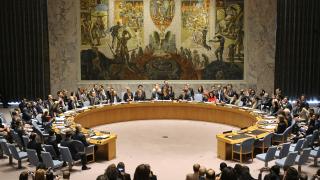
UNA-UK welcomes the resolution on the humanitarian situation in Syria adopted by the UN Security Council on 22 February. Given the lack of progress in finding a political solution, it is vital that this resolution is used to deliver results on the ground.
The text condemns violence against civilians and civilian facilities, and calls for unfettered humanitarian access. While it condemns violence committed by all parties, it reaffirms that the primary responsibility to protect civilians lies with the Syrian authorities.
It calls for the removal of all obstacles to humanitarian access, including through the lifting of sieges, making particular reference to the government's role in facilitating relief in the territories it controls. It also states unequivocally that impeding the supply of aid can constitute a violation of international law, and that those committing violations must be brought to justice.
The resolution was adopted unanimously, with Russia and China, who had previously vetoed similar resolutions, voting in favour. Russia is said to have backed the resolution after managing to remove a reference to sanctions. A line expressing the Council's intent to take "further steps" in the case of non-compliance, however, remains.
It reinforces and strengthens the October 2013 Presidential Statement by the Council, noting the rapid deterioriation in the humanitarian situation.
At that time, around six million Syrians were thought to be in need of assistance. This has risen to over nine million. The number of refugees now stands at 2.4 million, nearly all of whom are being hosted by Jordan (one of the resolution's co-sponsors), Lebanon, Iraq, Egypt and Turkey. Lebanon alone is hosting some one million refugees - almost a quarter of its population. In Europe, only Germany has pledged to take it a significant number of refugees (10,000). The resolution recognises their role and calls for support from the international community.
UNA-UK supports the call by a coalition of humanitarian, human rights and peace groups for swift implementation of the resolution, in particular progress by all parties, in the next 30 days, on five central points at a minimum:
- Lifting of sieges on populated areas and ensuring all people in besieged communities have safe and unhindered access to humanitarian aid;
- Opening of border crossings from neighbouring countries for deliveries of life-saving aid by both the UN and NGOs;
- Stream-lined procedures for approving humanitarian aid convoys and prompt approval of requests for convoys to travel to hard-to-reach areas;
- Cessation of attacks on schools and hospitals and the demilitarization of these facilities, as well as the facilitation of free passage for all medical personnel and equipment;
- Cessation of indiscriminate use of explosive weapons in populated areas, and any methods of warfare which do not respect the obligation under international humanitarian law to distinguish between civilian populations and combatants.






